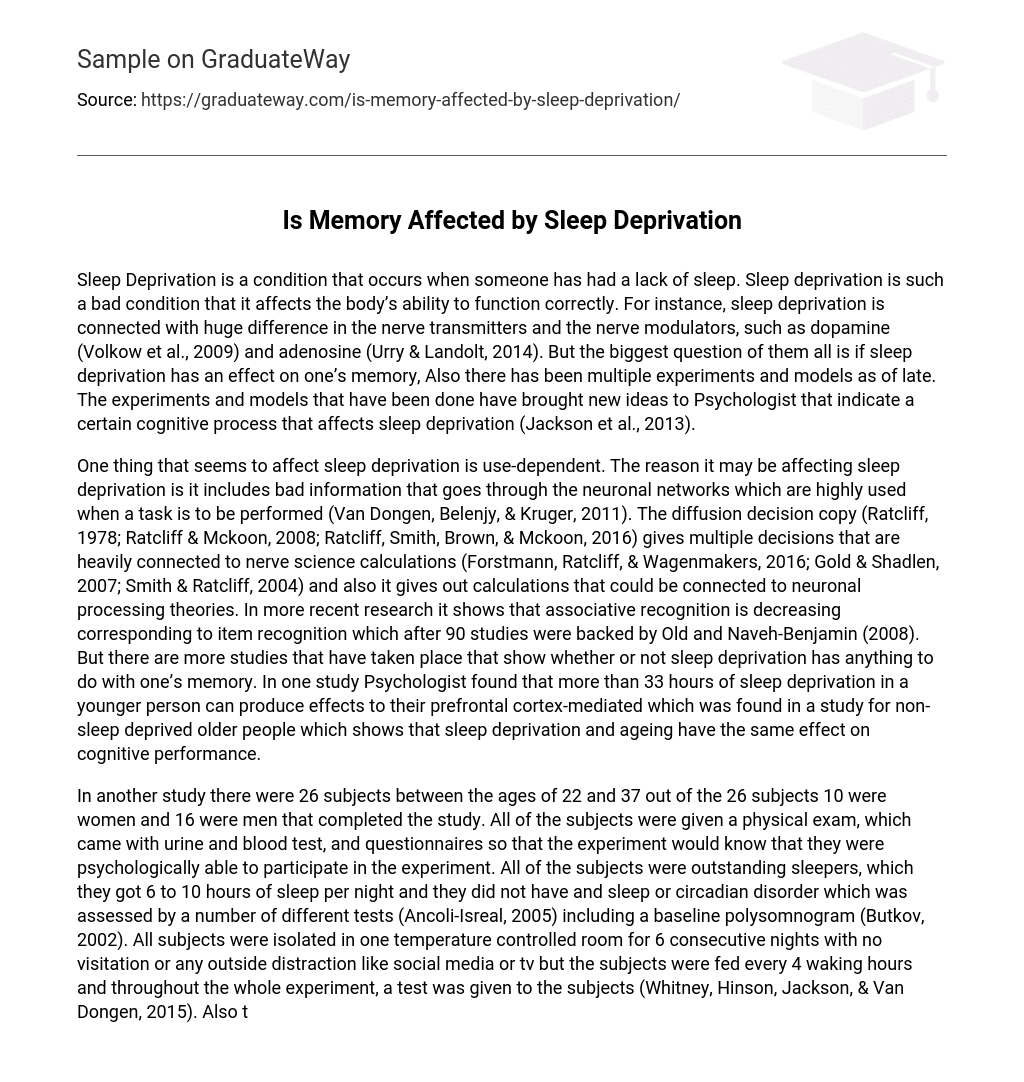Sleep Deprivation is a condition that occurs when someone has had a lack of sleep. Sleep deprivation is such a bad condition that it affects the body’s ability to function correctly. For instance, sleep deprivation is connected with huge difference in the nerve transmitters and the nerve modulators, such as dopamine (Volkow et al., 2009) and adenosine (Urry & Landolt, 2014). But the biggest question of them all is if sleep deprivation has an effect on one’s memory, Also there has been multiple experiments and models as of late. The experiments and models that have been done have brought new ideas to Psychologist that indicate a certain cognitive process that affects sleep deprivation (Jackson et al., 2013).
One thing that seems to affect sleep deprivation is use-dependent. The reason it may be affecting sleep deprivation is it includes bad information that goes through the neuronal networks which are highly used when a task is to be performed (Van Dongen, Belenjy, & Kruger, 2011). The diffusion decision copy (Ratcliff, 1978; Ratcliff & Mckoon, 2008; Ratcliff, Smith, Brown, & Mckoon, 2016) gives multiple decisions that are heavily connected to nerve science calculations (Forstmann, Ratcliff, & Wagenmakers, 2016; Gold & Shadlen, 2007; Smith & Ratcliff, 2004) and also it gives out calculations that could be connected to neuronal processing theories. In more recent research it shows that associative recognition is decreasing corresponding to item recognition which after 90 studies were backed by Old and Naveh-Benjamin (2008). But there are more studies that have taken place that show whether or not sleep deprivation has anything to do with one’s memory. In one study Psychologist found that more than 33 hours of sleep deprivation in a younger person can produce effects to their prefrontal cortex-mediated which was found in a study for non-sleep deprived older people which shows that sleep deprivation and ageing have the same effect on cognitive performance.
In another study there were 26 subjects between the ages of 22 and 37 out of the 26 subjects 10 were women and 16 were men that completed the study. All of the subjects were given a physical exam, which came with urine and blood test, and questionnaires so that the experiment would know that they were psychologically able to participate in the experiment. All of the subjects were outstanding sleepers, which they got 6 to 10 hours of sleep per night and they did not have and sleep or circadian disorder which was assessed by a number of different tests (Ancoli-Isreal, 2005) including a baseline polysomnogram (Butkov, 2002). All subjects were isolated in one temperature controlled room for 6 consecutive nights with no visitation or any outside distraction like social media or tv but the subjects were fed every 4 waking hours and throughout the whole experiment, a test was given to the subjects (Whitney, Hinson, Jackson, & Van Dongen, 2015). Also throughout the experiment subjects were kept awake by social interaction and different activities, this shows that the sleep deprivation involvement was successful Whitney et al. (2015). After the whole entire experiment, the item and associative recognition had the same reaction time as from the beginning baseline condition but there was a 60 ms (milliseconds) drop for the controlled subjects.
In conclusion, sleep deprivation can affect certain subjects in different ways. Some may have a reaction time drop and some may not I feel that there should be more testing done in the future to see if there is a bigger decrease in a subjects reaction time. Also, I feel that it all depends upon the subjects that are getting tested and the way they are being tested because certain tests can do certain things to a subject. After reading this my thought toward sleep deprivation has changed and it makes me want to change the ways that I sleep. Because after reading I see that sleep deprivation can have a huge effect on one’s life and the things that they can accomplish during times when they need to use certain recognition memory.
References
- Ancoli-Israel, S. (2005). Actigraphy. In M. H. Kryger, T. Roth, & W. C. Dement (Eds.), Principles and Practice of Sleep Medicine (4th ed., pp. 1459 –1467). Philadelphia, PA: Elsevier Saunders.
- Butkov, N. (2002). Polysomnography. In T. L. Lee-Chiong, M. J. Sateia, & M. A. Carskadon (Eds.), Sleep Medicine (pp. 605– 637). Philadelphia: Hanley & Belfus.
- Jackson, M. L., Gunzelmann, G., Whitney, P., Hinson, J. M., Belenky, G., Rabat, A., & Van Dongen, H. P. A. (2013). Deconstructing and reconstructing cognitive performance in sleep deprivation. Sleep Medicine Reviews, 17, 215–225.
- Old, S. R., & Naveh-Benjamin, M. (2008). Differential effects of aging on item and associative measures of memory: A meta-analysis. Psychology and Aging, 23, 104 –118.
- Ratcliff, Rodger; Van Dongen, Hans P. A. Journal of Experimental Psychology. Learning, Memory & Cognition. Feb2018, Vol. 44 Issue 2, p193-208. 16p.
- Ratcliff, R., Smith, P. L., Brown, S. D., & McKoon, G. (2016). Diffusion decision model: Current issues and history. Trends in Cognitive Sciences, 20, 260 –281.
- Urry, E., & Landolt, H. P. (2014). Adenosine, caffeine, and performance: From cognitive neuroscience of sleep to sleep pharmacogenetics. Current Topics in Behavioral Neurosciences, 25, 331–366.
- Volkow, N. D., Tomasi, D., Wang, G. J., Telang, F., Fowler, J. S., Wang, R. L., . . . Swanson, J. M. (2009). Hyperstimulation of striatal D2 receptors with sleep deprivation: Implications for cognitive impairment. NeuroImage, 45, 1232–1240
- Van Dongen, H. P. A., Belenky, G., & Krueger, J. M. (2011). A local, bottom-up perspective on sleep deprivation and neurobehavioral performance. Current Topics in Medicinal Chemistry, 11, 2414 –2422.
- Whitney, P., Hinson, J. M., Jackson, M. L., & Van Dongen, H. P. A. (2015). Feedback blunting: Total sleep deprivation impairs decision making that requires updating based on feedback. Sleep: Journal of Sleep and Sleep Disorders Research, 38, 745–754.





